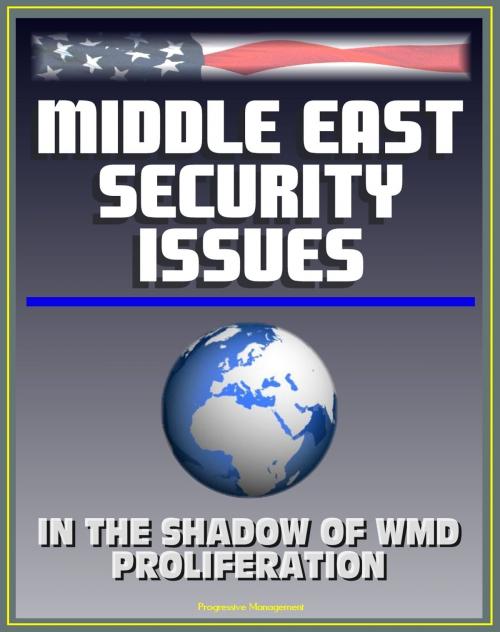Middle East Security Issues: In the Shadow of Weapons of Mass Destruction Proliferation - WMD, Iran, Iraq, Israel, Persian Gulf, Arab Perspectives
Nonfiction, Social & Cultural Studies, Political Science| Author: | Progressive Management | ISBN: | 9781476203911 |
| Publisher: | Progressive Management | Publication: | June 7, 2012 |
| Imprint: | Smashwords Edition | Language: | English |
| Author: | Progressive Management |
| ISBN: | 9781476203911 |
| Publisher: | Progressive Management |
| Publication: | June 7, 2012 |
| Imprint: | Smashwords Edition |
| Language: | English |
The Middle East is an international flashpoint, a place where open warfare could erupt at any time. It is the home of numerous countries possessing some combination of weapons of mass destruction (WMD) (nuclear, biological, or chemical weapons), and is an area where states are developing an increasing capability to deliver such WMD by missiles and/or aircraft. The Middle East is also the home of US friends who oppose each other as well as rogue states who are hostile to the United States. In short, the Middle East is a WMD war waiting to happen. Such a conflict would harm US allies and US interests; it needs to be avoided. Or, if WMD warfare occurs, such a conflict needs to be limited and the United States and allied forces need to be prepared to cope with the effects.
The authors of this study address important questions that demand an answer if US national security policy is to be well informed. In chapter 1, "NBC and Missile Proliferation in the Middle East," Dr. Lawrence Scheinman, director of the Washington, D.C., office of the Monterey Institute of International Studies, summarizes the nuclear, biological, and chemical weapons capabilities and missile systems of Egypt, Iran, Iraq, Israel, Libya, and Syria. He sees the region as one of the most tension-ridden, conflict-prone and heavily armed regions of the world. He addresses the questions of what the various state players have, why they have it, and what this implies for the stability of the region. He notes that WMD has already been used repeatedly in the region. For example, Egypt, Syria, Iraq, and Iran have used chemical weapons against their adversaries. Iran and Iraq from 1980-88 engaged in the first two-way ballistic missile war in history. As the range of delivery systems increases, and as warheads are loaded with more lethal payloads, the situation will become more threatening should warfare be renewed in the region. Scheinman argues that while the United States and its allies need an effective deterrent and defense capability (counterproliferation), he believes that stability is best served by universal adherence to, and compliance with treaties to prevent the proliferation of WMD.
1 NBC and Missile Proliferation Issues in the Middle East * 2 Recent Military Developments in the Persian Gulf * 3 Arab Perspectives on Middle Eastern Security * 4 Regional Security and Arms Control in the Middle East: The Nuclear Dimension * 5 The Egyptian-Israeli Confrontation over the Nuclear Nonproliferation Treaty
The Middle East is an international flashpoint, a place where open warfare could erupt at any time. It is the home of numerous countries possessing some combination of weapons of mass destruction (WMD) (nuclear, biological, or chemical weapons), and is an area where states are developing an increasing capability to deliver such WMD by missiles and/or aircraft. The Middle East is also the home of US friends who oppose each other as well as rogue states who are hostile to the United States. In short, the Middle East is a WMD war waiting to happen. Such a conflict would harm US allies and US interests; it needs to be avoided. Or, if WMD warfare occurs, such a conflict needs to be limited and the United States and allied forces need to be prepared to cope with the effects.
The authors of this study address important questions that demand an answer if US national security policy is to be well informed. In chapter 1, "NBC and Missile Proliferation in the Middle East," Dr. Lawrence Scheinman, director of the Washington, D.C., office of the Monterey Institute of International Studies, summarizes the nuclear, biological, and chemical weapons capabilities and missile systems of Egypt, Iran, Iraq, Israel, Libya, and Syria. He sees the region as one of the most tension-ridden, conflict-prone and heavily armed regions of the world. He addresses the questions of what the various state players have, why they have it, and what this implies for the stability of the region. He notes that WMD has already been used repeatedly in the region. For example, Egypt, Syria, Iraq, and Iran have used chemical weapons against their adversaries. Iran and Iraq from 1980-88 engaged in the first two-way ballistic missile war in history. As the range of delivery systems increases, and as warheads are loaded with more lethal payloads, the situation will become more threatening should warfare be renewed in the region. Scheinman argues that while the United States and its allies need an effective deterrent and defense capability (counterproliferation), he believes that stability is best served by universal adherence to, and compliance with treaties to prevent the proliferation of WMD.
1 NBC and Missile Proliferation Issues in the Middle East * 2 Recent Military Developments in the Persian Gulf * 3 Arab Perspectives on Middle Eastern Security * 4 Regional Security and Arms Control in the Middle East: The Nuclear Dimension * 5 The Egyptian-Israeli Confrontation over the Nuclear Nonproliferation Treaty















